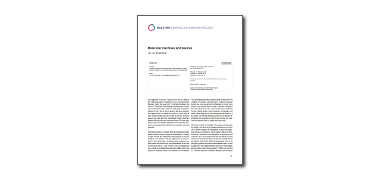Emerging targeting strategies and next generation of nanomedicines

Prof. Anna Salvati, University of Groningen, The Netherlands
Prof. Silvia Giordani, Dublin City University, Ireland
Prof. Wolfgang J. Parak, University of Hamburg, Germany
Nanomedicine is the research field dedicated to the application of nanotechnology in the medical field by combining nano- and biomaterials to improve drug delivery and address the diagnosis and treatment of complex pathologies. One of the main goals of this research field is to enhance drug efficacy while minimizing side effects. Some strategies, such as modification of interface properties and functionalization of drug delivery systems improve the properties of drug delivery systems for precision medicine. Research efforts are also focused on the identification of factors affecting drug targeting and efficacy. New strategies, such as stimuli-responsive materials and endogenous targeting, are emerging to overcome current barriers in drug delivery. With respect to targeting, passive targeting, takes advantage of the permeability of tumor blood vessels to accumulate in tumor tissue, thus it is a common approach in nanomedicine for cancer therapy. Active targeting involves functionalizing nanomedicines with ligands to specifically recognize targeted areas.
The main goals of this thematic issue are to collect contributions emerging from the Beilstein Nanomedicine Symposium (taking place in September 3–5, 2024, Rüdesheim, Germany) and also to allow for submissions of worldwide pre-clinical research in several topics of nanomedicine.
Contributions to this thematic issue are invited, including (but not limited to):
- Advances of nanomedicines and their potential in precise targeting therapies.
- Personalized medicine and reliable pre-clinical assessments.
- Synthesis and functionalization of nanobiomaterials.
- Nanotechnology applied to therapy and medical diagnostics.
- Pharmaceutical nanotechnology.
Download all of the current publications in this thematic issue by clicking on "Download Issue".
Cholesterol nanoarchaeosomes for alendronate targeted delivery as an anti-endothelial dysfunction agent
- Horacio Emanuel Jerez,
- Yamila Roxana Simioni,
- Kajal Ghosal,
- Maria Jose Morilla and
- Eder Lilia Romero
Beilstein J. Nanotechnol. 2024, 15, 517–534, doi:10.3762/bjnano.15.46

Electrospun polysuccinimide scaffolds containing different salts as potential wound dressing material
- Veronika Pálos,
- Krisztina S. Nagy,
- Rita Pázmány,
- Krisztina Juriga-Tóth,
- Bálint Budavári,
- Judit Domokos,
- Dóra Szabó,
- Ákos Zsembery and
- Angela Jedlovszky-Hajdu
Beilstein J. Nanotechnol. 2024, 15, 781–796, doi:10.3762/bjnano.15.65

Entry of nanoparticles into cells and tissues: status and challenges
- Kirsten Sandvig,
- Tore Geir Iversen and
- Tore Skotland
Beilstein J. Nanotechnol. 2024, 15, 1017–1029, doi:10.3762/bjnano.15.83

Recent updates in applications of nanomedicine for the treatment of hepatic fibrosis
- Damai Ria Setyawati,
- Fransiska Christydira Sekaringtyas,
- Riyona Desvy Pratiwi,
- A’liyatur Rosyidah,
- Rohimmahtunnissa Azhar,
- Nunik Gustini,
- Gita Syahputra,
- Idah Rosidah,
- Etik Mardliyati,
- Tarwadi and
- Sjaikhurrizal El Muttaqien
Beilstein J. Nanotechnol. 2024, 15, 1105–1116, doi:10.3762/bjnano.15.89

Realizing active targeting in cancer nanomedicine with ultrasmall nanoparticles
- André F. Lima,
- Giselle Z. Justo and
- Alioscka A. Sousa
Beilstein J. Nanotechnol. 2024, 15, 1208–1226, doi:10.3762/bjnano.15.98

Dual-functionalized architecture enables stable and tumor cell-specific SiO2NPs in complex biological fluids
- Iris Renata Sousa Ribeiro,
- Raquel Frenedoso da Silva,
- Romênia Ramos Domingues,
- Adriana Franco Paes Leme and
- Mateus Borba Cardoso
Beilstein J. Nanotechnol. 2024, 15, 1238–1252, doi:10.3762/bjnano.15.100

Nanotechnological approaches for efficient N2B delivery: from small-molecule drugs to biopharmaceuticals
- Selin Akpinar Adscheid,
- Akif E. Türeli,
- Nazende Günday-Türeli and
- Marc Schneider
Beilstein J. Nanotechnol. 2024, 15, 1400–1414, doi:10.3762/bjnano.15.113

Mechanistic insights into endosomal escape by sodium oleate-modified liposomes
- Ebrahim Sadaqa,
- Satrialdi,
- Fransiska Kurniawan and
- Diky Mudhakir
Beilstein J. Nanotechnol. 2024, 15, 1667–1685, doi:10.3762/bjnano.15.131

Nanocarriers and macrophage interaction: from a potential hurdle to an alternative therapeutic strategy
- Naths Grazia Sukubo,
- Paolo Bigini and
- Annalisa Morelli
Beilstein J. Nanotechnol. 2025, 16, 97–118, doi:10.3762/bjnano.16.10

Synthetic-polymer-assisted antisense oligonucleotide delivery: targeted approaches for precision disease treatment
- Ana Cubillo Alvarez,
- Dylan Maguire and
- Ruairí P. Brannigan
Beilstein J. Nanotechnol. 2025, 16, 435–463, doi:10.3762/bjnano.16.34

Serum heat inactivation diminishes ApoE-mediated uptake of D-Lin-MC3-DMA lipid nanoparticles
- Demian van Straten,
- Luuk van de Schepop,
- Rowan Frunt,
- Pieter Vader and
- Raymond M. Schiffelers
Beilstein J. Nanotechnol. 2025, 16, 740–748, doi:10.3762/bjnano.16.57

A calix[4]arene-based supramolecular nanoassembly targeting cancer cells and triggering the release of nitric oxide with green light
- Cristina Parisi,
- Loredana Ferreri,
- Tassia J. Martins,
- Francesca Laneri,
- Samantha Sollima,
- Antonina Azzolina,
- Antonella Cusimano,
- Nicola D’Antona,
- Grazia M. L. Consoli and
- Salvatore Sortino
Beilstein J. Nanotechnol. 2025, 16, 1003–1013, doi:10.3762/bjnano.16.75

Ferroptosis induction by engineered liposomes for enhanced tumor therapy
- Alireza Ghasempour,
- Mohammad Amin Tokallou,
- Mohammad Reza Naderi Allaf,
- Mohsen Moradi,
- Hamideh Dehghan,
- Mahsa Sedighi,
- Mohammad-Ali Shahbazi and
- Fahimeh Lavi Arab
Beilstein J. Nanotechnol. 2025, 16, 1325–1349, doi:10.3762/bjnano.16.97

Exploring the potential of polymers: advancements in oral nanocarrier technology
- Rousilândia de Araujo Silva,
- Igor Eduardo Silva Arruda,
- Luise Lopes Chaves,
- Mônica Felts de La Roca Soares and
- Jose Lamartine Soares Sobrinho
Beilstein J. Nanotechnol. 2025, 16, 1751–1793, doi:10.3762/bjnano.16.122

Toward clinical translation of carbon nanomaterials in anticancer drug delivery: the need for standardisation
- Michał Bartkowski,
- Francesco Calzaferri and
- Silvia Giordani
Beilstein J. Nanotechnol. 2025, 16, 2092–2104, doi:10.3762/bjnano.16.144





































































































